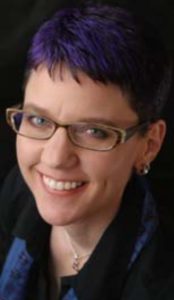Eileen Coly Research Grants Program

PF’s long standing grant program has been renamed in honor of PF’s second President, Mrs. Eileen Coly, who took great pride in administering our prolific grant program during her administration. A preliminary letter of request for application can be submitted at any time providing a brief explanation of the research anticipated, along with the investigators CVs. Should the PF be interested in considering such a research grant, an application form will be sent to the inquirer and a modest grant will be awarded if the PF chooses to do so.
What follows is information of our last Grantee under this program.
The 2018 Eileen Coly Grant Recipient is Dr. Julie Beischel
As Julie wrote on her grant application:

“Surveys regarding anomalous beliefs and experiences have been an important methodology in parapsychology though they have often focused on dysfunction. We used established survey development and piloting methods to create novel web-based instruments including the Windbridge Psi and Related Phenomena Awareness Scale (WPRPAS) which assesses, without using loaded terminology or judgmental language, respondents’ awareness of phenomena including energy healing, mediumistic communication, telepathy, clairvoyance, micro- and macro-psychokinesis, out-of-body experiences, near-death experiences, and children who remember past lives. Data was collected from roughly 1,400 Internet-using Americans. The grant will cover analysis of the collected data.” Julie went on to describe both the Windbridge Institute and the newly formed nonprofit, Windbridge Research Center. Herewith in Julie’s own words:
Institute
Launched in 2008, the Windbridge Institute, LLC, is dedicated to conducting world-class research on phenomena currently unexplained within traditional scientific disciplines. Our primary focus is on applied research with the goal of developing and distributing information, services, and technologies that allow people to reach their full potential so they can live happier, healthier, and more fulfilling lives. Our main areas of research and development include Mindfulness, Intuition, and Intention.
Since starting the Institute, three main themes have emerged in our research projects regarding psi phenomena: Normalize, Optimize, and Utilize.
Normalize: Our goal is to demystify occurrences of psi functioning (like precognition, telepathy, clairvoyance, and mind-matter interactions) and other spiritually transformative experiences through empirical research and education.
Optimize: Through the use of traditional mindfulness practices, new emerging technologies, and creative expression, we are developing tools and experiences which allow people to understand and potently tap into and enhance their own intuitive abilities.
Utilize: Armed with this better understanding of our full human potential, we apply what we learn to solve real-world problems.
For more information, see: http://windbridgeinstitute.com/
Center
In July 2017, the Windbridge Research Center, a 501(c)(3) tax-exempt Arizona non-profit, took over the peer-reviewed research on the topics of life after death and after-death communication that had been conducted at the Windbridge Institute, LLC, since 2008. The Center has also added outreach and educational activities to this research. The mission of the Windbridge Research Center is to ease suffering around dying, death, and what comes next by performing rigorous scientific research and sharing the results and other customized content with practitioners, clinicians, scientists, and the general public.
For more information, see: http://www.windbridge.org/
Center and Institute
The Windbridge Research Center focuses on the charitable activities of performing rigorous scientific research and public education regarding dying, death, and what comes next while parapsychology-related application development in the areas of mindfulness, intuition, and intention remain at the Windbridge Institute, LLC. For a video explaining the evolution of the Windbridge Institute and the Windbridge Research Center, see https://youtu.be/LWW7RiVYTpM”
We are very pleased to welcome Dr. Julie Beischel to our long list of well deserving and creative grant recipients.
 Residing on the North Shore of Boston since 1978, Dr. Levin was born in Moscow, Russia. “My interest in science can likely be traced to my dad’s taking the back off of our old black and white television to show me what was inside when I was about 4 years old. This device displayed moving pictures of things that weren’t actually in the box at all! It was obvious to me that whoever knew how to make the parts and connect them together to make it work — they were clearly on to something very important. I was hooked, wanting to participate in the process of discovering the subtle rules of the world that make everything possible.”
Residing on the North Shore of Boston since 1978, Dr. Levin was born in Moscow, Russia. “My interest in science can likely be traced to my dad’s taking the back off of our old black and white television to show me what was inside when I was about 4 years old. This device displayed moving pictures of things that weren’t actually in the box at all! It was obvious to me that whoever knew how to make the parts and connect them together to make it work — they were clearly on to something very important. I was hooked, wanting to participate in the process of discovering the subtle rules of the world that make everything possible.”
Levin wanted to work on artificial intelligence and the cybernetics of complex adaptive systems, receiving a Bachelor’s degree from Tufts University in computer science. He then changed course from a focus on engineering, deciding that it would be more exciting to investigate the mechanisms by which living things repair damage, learn from experience, and reproduce themselves. He pursued graduate studies in developmental, cell, and molecular biology at Harvard Medical School, receiving a Ph.D. in genetics based on his discovery of the molecular pathways that establish consistent left-right asymmetry in the organs of vertebrate embryos. Levin’s group works on the role of molecular biophysical signals that control biological shape (pattern formation) during embryonic development and adult regeneration. This work has applications to the understanding of birth defects, as well as the development of new technologies to augment regeneration of tissues and organs in biomedical settings.
Dr. Levin is also highly interested in the role of information in fundamental physics (quantum mechanics, thermodynamics, and theory of computation) and its processing and storage by cells and organisms. The interactions of living systems with true (quantum) random number generators (RNGs) provide an opportunity to address some very fundamental questions about the role of information in the most fundamental aspects of the Universe.
On His Research
The project supported by the Eileen Coly Grant for Research was at the intersection of his long-standing interest in philosophy of mind, cognitive science, and artificial intelligence with the interactions of living systems with quantum processes.
His experiments asked whether an artificial intelligence (“intentional systems” implemented in software or hardware) is able to interact with a quantum RNG in the same way as has been shown for living systems (e.g., through the work of the PEAR lab at Princeton). An affirmative answer will have profound implications for anomalous interactions between living and non-living systems, engineering, philosophy of mind, and cognitive science. If non-biological symbol-manipulating systems (computer programs and robots) can affect RNG behavior the way that insects, mice, and human beings have been shown to do, it will suggest that the functionalist view of the philosophy of mind is correct — that true “mind” really is just the manipulation of abstract symbols and that its physical implementation is irrelevant.
The discovery that specific biological structures are not required for the anomalous mind-machine interaction, and that formal symbol processing algorithms are sufficient for this, would have huge implications for the mind-body problem and say something extremely important about the place of mind (and the nature of consciousness) in our universe. In contrast, a negative answer from the experiments would argue against the functionalist definition of mind, supporting instead Alan Turing’s view, that anomalous information transfer tasks can distinguish a simulated intelligence from a real one. The outcome is intimately tied to the dualism-materialism debate in parapsychology, and Dr. Levin hopes his work will contribute to the elucidation of the properties of mind-matter interaction. If successful, we will have learned what it really is about a mind that allows it to affect a physical process at the quantum level, and thus, about the nature of a mind itself.
About the Eileen Coly Grant for Research
The Parapsychology Foundation’s Eileen Coly Grant for Research program considered proposals for original research. The Coly Grant of $5,000 was awarded annually through 2008. Due to the financial downturn, the Coly Grant, along with many of the other awards, fellowships, grants and prizes were closed to further applications. The overall programs for scholarlyand student support will be evaluated in 2016, the 65th anniversary of the founding of the PF. At some point in 2016, the decisions about funding will be announced.
The Grant was conceived in the name of Parapsychology Foundation’s second President on the occasion of her 90th birthday, recognizing Mrs. Coly’s life-long dedication to research in the science of parapsychology.
When it was being offered, the grant was available for universities, laboratories, scientists, scholars, clinicians, and individuals. Proposals for experimental research, field investigations, questionnaire or survey research, bibliographic or historical research, discourse or other textual research, and/or for clinical or medical case studies or clinical trials were eligible. Individuals who have received PF scholarships, awards or research grants in the past were also eligible to apply.
There was no limitation on the academic discipline on which the research may be based. However, applicants were encouraged to state clearly in the proposal both the relevance of their particular approach to the proposed research and the potential of their project to further the goals of scientific parapsychology. Interdisciplinary or multi-disciplinary approaches was encouraged.
Applicants submitted a cover letter introducing the grant proposal and making a case for its importance to parapsychology, a brief research proposal of no more than 2000 words (not including references) with a clear description of methodology and procedure, a time-frame through to completion, and a budget not to exceed $5,000. Curriculum vitae were also supplied for the primary investigator(s) and resumes for staff or assistants. When the Coly Grant was being offered, the deadline for application was August 15th of every year.
The successful applicant(s) were notified on or around September 1st of each year. Grantees were expected to provide the Foundation with a research report and a full accounting of expenditures upon completion of the project which may be summarized or published on the Foundation’s websites and archived in the Foundation’s manuscript collection.
***********
For more information about previous recipients of the Eileen Coly Grant for Research click here.